Financial Accounting Report: Financial Statements and Analysis
VerifiedAdded on 2021/02/19
|29
|3429
|88
Report
AI Summary
This report provides a comprehensive overview of financial accounting, beginning with a definition of the field and its importance to both internal and external stakeholders. It details the purposes of financial accounting, including determining operational results, evaluating financial positions, controlling assets, providing information to tax authorities, and aiding in cash planning. The report then analyzes internal and external stakeholders, explaining their interests in financial information. It includes practical examples, such as client case studies, showcasing the application of accounting principles like double-entry recording, profit and loss account preparation, and the formulation of statements of financial position. Furthermore, the report covers key accounting concepts such as consistency and prudence, along with depreciation methods like the straight-line and diminishing balance methods. It concludes by highlighting the differences between financial statements prepared by sole traders and limited companies, offering a well-rounded understanding of financial accounting principles and their practical applications.

Financial Accounting
Principles
Principles
Paraphrase This Document
Need a fresh take? Get an instant paraphrase of this document with our AI Paraphraser

Table of Contents
INTRODUCTION...........................................................................................................................3
Part (a)..............................................................................................................................................3
Part (b).............................................................................................................................................6
Client 2.......................................................................................................................................19
Client 3.......................................................................................................................................22
Client 4.......................................................................................................................................24
Client 5.......................................................................................................................................26
CONCLUSION..............................................................................................................................28
REFERENCES..............................................................................................................................29
INTRODUCTION...........................................................................................................................3
Part (a)..............................................................................................................................................3
Part (b).............................................................................................................................................6
Client 2.......................................................................................................................................19
Client 3.......................................................................................................................................22
Client 4.......................................................................................................................................24
Client 5.......................................................................................................................................26
CONCLUSION..............................................................................................................................28
REFERENCES..............................................................................................................................29
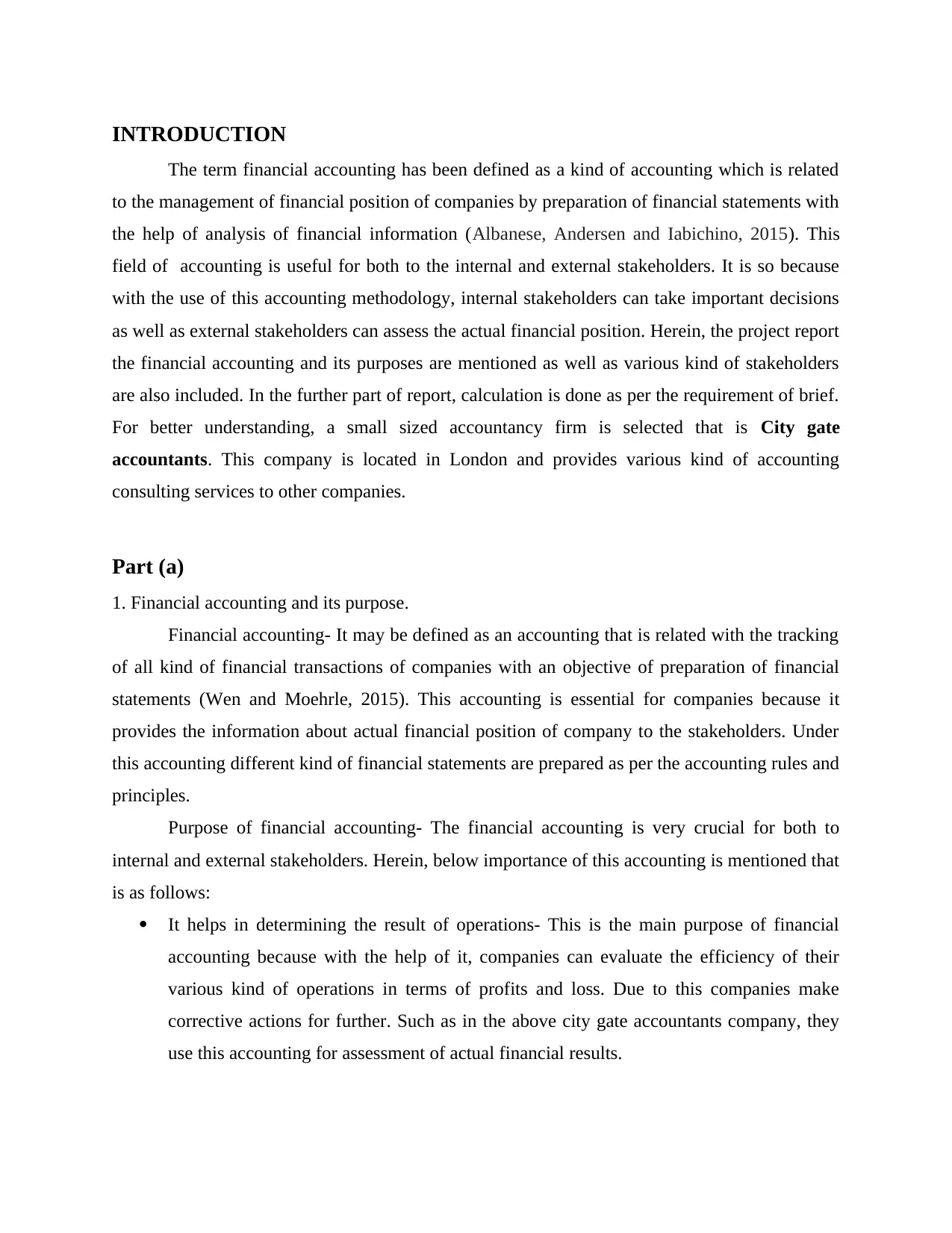
INTRODUCTION
The term financial accounting has been defined as a kind of accounting which is related
to the management of financial position of companies by preparation of financial statements with
the help of analysis of financial information (Albanese, Andersen and Iabichino, 2015). This
field of accounting is useful for both to the internal and external stakeholders. It is so because
with the use of this accounting methodology, internal stakeholders can take important decisions
as well as external stakeholders can assess the actual financial position. Herein, the project report
the financial accounting and its purposes are mentioned as well as various kind of stakeholders
are also included. In the further part of report, calculation is done as per the requirement of brief.
For better understanding, a small sized accountancy firm is selected that is City gate
accountants. This company is located in London and provides various kind of accounting
consulting services to other companies.
Part (a)
1. Financial accounting and its purpose.
Financial accounting- It may be defined as an accounting that is related with the tracking
of all kind of financial transactions of companies with an objective of preparation of financial
statements (Wen and Moehrle, 2015). This accounting is essential for companies because it
provides the information about actual financial position of company to the stakeholders. Under
this accounting different kind of financial statements are prepared as per the accounting rules and
principles.
Purpose of financial accounting- The financial accounting is very crucial for both to
internal and external stakeholders. Herein, below importance of this accounting is mentioned that
is as follows:
It helps in determining the result of operations- This is the main purpose of financial
accounting because with the help of it, companies can evaluate the efficiency of their
various kind of operations in terms of profits and loss. Due to this companies make
corrective actions for further. Such as in the above city gate accountants company, they
use this accounting for assessment of actual financial results.
The term financial accounting has been defined as a kind of accounting which is related
to the management of financial position of companies by preparation of financial statements with
the help of analysis of financial information (Albanese, Andersen and Iabichino, 2015). This
field of accounting is useful for both to the internal and external stakeholders. It is so because
with the use of this accounting methodology, internal stakeholders can take important decisions
as well as external stakeholders can assess the actual financial position. Herein, the project report
the financial accounting and its purposes are mentioned as well as various kind of stakeholders
are also included. In the further part of report, calculation is done as per the requirement of brief.
For better understanding, a small sized accountancy firm is selected that is City gate
accountants. This company is located in London and provides various kind of accounting
consulting services to other companies.
Part (a)
1. Financial accounting and its purpose.
Financial accounting- It may be defined as an accounting that is related with the tracking
of all kind of financial transactions of companies with an objective of preparation of financial
statements (Wen and Moehrle, 2015). This accounting is essential for companies because it
provides the information about actual financial position of company to the stakeholders. Under
this accounting different kind of financial statements are prepared as per the accounting rules and
principles.
Purpose of financial accounting- The financial accounting is very crucial for both to
internal and external stakeholders. Herein, below importance of this accounting is mentioned that
is as follows:
It helps in determining the result of operations- This is the main purpose of financial
accounting because with the help of it, companies can evaluate the efficiency of their
various kind of operations in terms of profits and loss. Due to this companies make
corrective actions for further. Such as in the above city gate accountants company, they
use this accounting for assessment of actual financial results.
⊘ This is a preview!⊘
Do you want full access?
Subscribe today to unlock all pages.

Trusted by 1+ million students worldwide
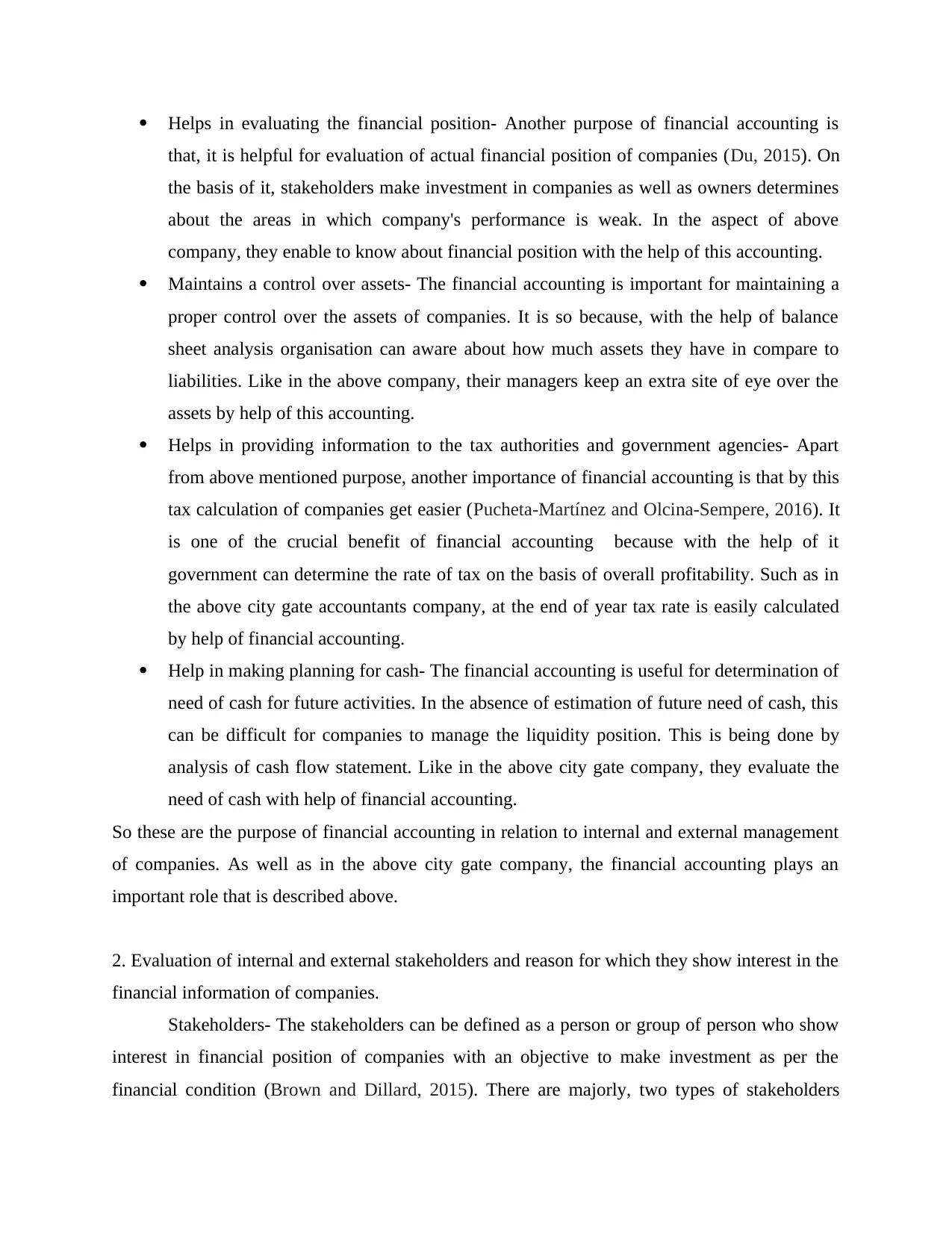
Helps in evaluating the financial position- Another purpose of financial accounting is
that, it is helpful for evaluation of actual financial position of companies (Du, 2015). On
the basis of it, stakeholders make investment in companies as well as owners determines
about the areas in which company's performance is weak. In the aspect of above
company, they enable to know about financial position with the help of this accounting.
Maintains a control over assets- The financial accounting is important for maintaining a
proper control over the assets of companies. It is so because, with the help of balance
sheet analysis organisation can aware about how much assets they have in compare to
liabilities. Like in the above company, their managers keep an extra site of eye over the
assets by help of this accounting.
Helps in providing information to the tax authorities and government agencies- Apart
from above mentioned purpose, another importance of financial accounting is that by this
tax calculation of companies get easier (Pucheta‐Martínez and Olcina‐Sempere, 2016). It
is one of the crucial benefit of financial accounting because with the help of it
government can determine the rate of tax on the basis of overall profitability. Such as in
the above city gate accountants company, at the end of year tax rate is easily calculated
by help of financial accounting.
Help in making planning for cash- The financial accounting is useful for determination of
need of cash for future activities. In the absence of estimation of future need of cash, this
can be difficult for companies to manage the liquidity position. This is being done by
analysis of cash flow statement. Like in the above city gate company, they evaluate the
need of cash with help of financial accounting.
So these are the purpose of financial accounting in relation to internal and external management
of companies. As well as in the above city gate company, the financial accounting plays an
important role that is described above.
2. Evaluation of internal and external stakeholders and reason for which they show interest in the
financial information of companies.
Stakeholders- The stakeholders can be defined as a person or group of person who show
interest in financial position of companies with an objective to make investment as per the
financial condition (Brown and Dillard, 2015). There are majorly, two types of stakeholders
that, it is helpful for evaluation of actual financial position of companies (Du, 2015). On
the basis of it, stakeholders make investment in companies as well as owners determines
about the areas in which company's performance is weak. In the aspect of above
company, they enable to know about financial position with the help of this accounting.
Maintains a control over assets- The financial accounting is important for maintaining a
proper control over the assets of companies. It is so because, with the help of balance
sheet analysis organisation can aware about how much assets they have in compare to
liabilities. Like in the above company, their managers keep an extra site of eye over the
assets by help of this accounting.
Helps in providing information to the tax authorities and government agencies- Apart
from above mentioned purpose, another importance of financial accounting is that by this
tax calculation of companies get easier (Pucheta‐Martínez and Olcina‐Sempere, 2016). It
is one of the crucial benefit of financial accounting because with the help of it
government can determine the rate of tax on the basis of overall profitability. Such as in
the above city gate accountants company, at the end of year tax rate is easily calculated
by help of financial accounting.
Help in making planning for cash- The financial accounting is useful for determination of
need of cash for future activities. In the absence of estimation of future need of cash, this
can be difficult for companies to manage the liquidity position. This is being done by
analysis of cash flow statement. Like in the above city gate company, they evaluate the
need of cash with help of financial accounting.
So these are the purpose of financial accounting in relation to internal and external management
of companies. As well as in the above city gate company, the financial accounting plays an
important role that is described above.
2. Evaluation of internal and external stakeholders and reason for which they show interest in the
financial information of companies.
Stakeholders- The stakeholders can be defined as a person or group of person who show
interest in financial position of companies with an objective to make investment as per the
financial condition (Brown and Dillard, 2015). There are majorly, two types of stakeholders
Paraphrase This Document
Need a fresh take? Get an instant paraphrase of this document with our AI Paraphraser
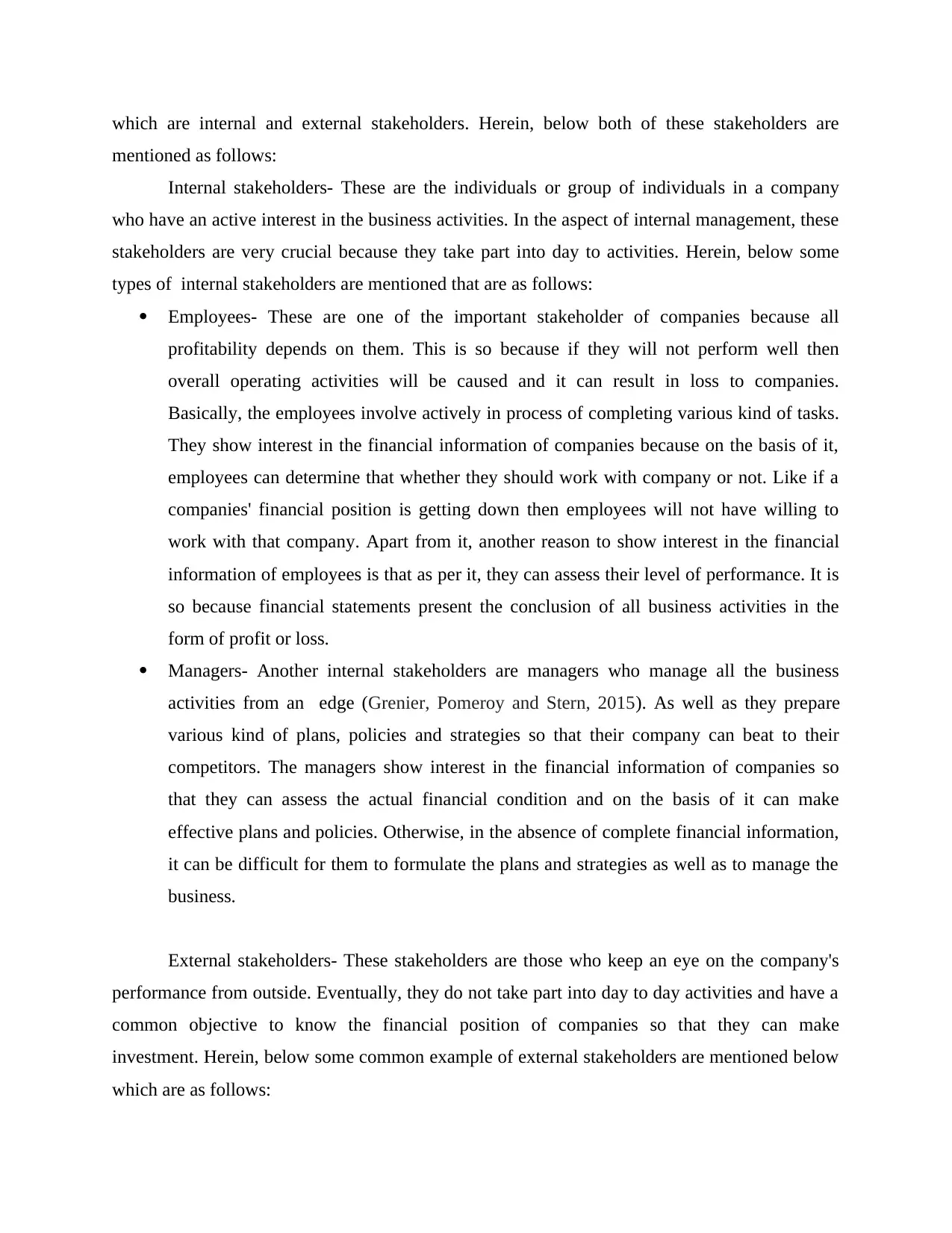
which are internal and external stakeholders. Herein, below both of these stakeholders are
mentioned as follows:
Internal stakeholders- These are the individuals or group of individuals in a company
who have an active interest in the business activities. In the aspect of internal management, these
stakeholders are very crucial because they take part into day to activities. Herein, below some
types of internal stakeholders are mentioned that are as follows:
Employees- These are one of the important stakeholder of companies because all
profitability depends on them. This is so because if they will not perform well then
overall operating activities will be caused and it can result in loss to companies.
Basically, the employees involve actively in process of completing various kind of tasks.
They show interest in the financial information of companies because on the basis of it,
employees can determine that whether they should work with company or not. Like if a
companies' financial position is getting down then employees will not have willing to
work with that company. Apart from it, another reason to show interest in the financial
information of employees is that as per it, they can assess their level of performance. It is
so because financial statements present the conclusion of all business activities in the
form of profit or loss.
Managers- Another internal stakeholders are managers who manage all the business
activities from an edge (Grenier, Pomeroy and Stern, 2015). As well as they prepare
various kind of plans, policies and strategies so that their company can beat to their
competitors. The managers show interest in the financial information of companies so
that they can assess the actual financial condition and on the basis of it can make
effective plans and policies. Otherwise, in the absence of complete financial information,
it can be difficult for them to formulate the plans and strategies as well as to manage the
business.
External stakeholders- These stakeholders are those who keep an eye on the company's
performance from outside. Eventually, they do not take part into day to day activities and have a
common objective to know the financial position of companies so that they can make
investment. Herein, below some common example of external stakeholders are mentioned below
which are as follows:
mentioned as follows:
Internal stakeholders- These are the individuals or group of individuals in a company
who have an active interest in the business activities. In the aspect of internal management, these
stakeholders are very crucial because they take part into day to activities. Herein, below some
types of internal stakeholders are mentioned that are as follows:
Employees- These are one of the important stakeholder of companies because all
profitability depends on them. This is so because if they will not perform well then
overall operating activities will be caused and it can result in loss to companies.
Basically, the employees involve actively in process of completing various kind of tasks.
They show interest in the financial information of companies because on the basis of it,
employees can determine that whether they should work with company or not. Like if a
companies' financial position is getting down then employees will not have willing to
work with that company. Apart from it, another reason to show interest in the financial
information of employees is that as per it, they can assess their level of performance. It is
so because financial statements present the conclusion of all business activities in the
form of profit or loss.
Managers- Another internal stakeholders are managers who manage all the business
activities from an edge (Grenier, Pomeroy and Stern, 2015). As well as they prepare
various kind of plans, policies and strategies so that their company can beat to their
competitors. The managers show interest in the financial information of companies so
that they can assess the actual financial condition and on the basis of it can make
effective plans and policies. Otherwise, in the absence of complete financial information,
it can be difficult for them to formulate the plans and strategies as well as to manage the
business.
External stakeholders- These stakeholders are those who keep an eye on the company's
performance from outside. Eventually, they do not take part into day to day activities and have a
common objective to know the financial position of companies so that they can make
investment. Herein, below some common example of external stakeholders are mentioned below
which are as follows:
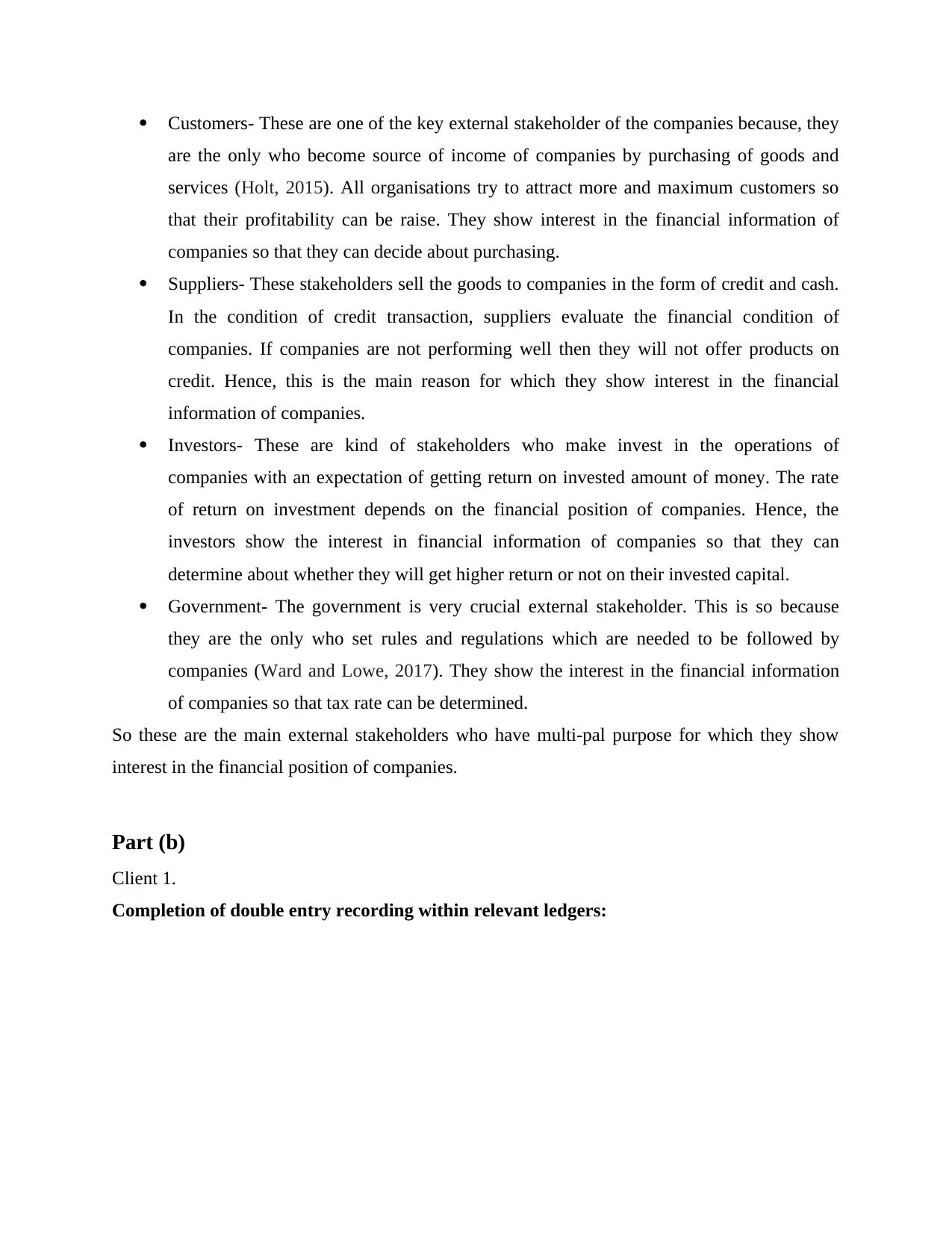
Customers- These are one of the key external stakeholder of the companies because, they
are the only who become source of income of companies by purchasing of goods and
services (Holt, 2015). All organisations try to attract more and maximum customers so
that their profitability can be raise. They show interest in the financial information of
companies so that they can decide about purchasing.
Suppliers- These stakeholders sell the goods to companies in the form of credit and cash.
In the condition of credit transaction, suppliers evaluate the financial condition of
companies. If companies are not performing well then they will not offer products on
credit. Hence, this is the main reason for which they show interest in the financial
information of companies.
Investors- These are kind of stakeholders who make invest in the operations of
companies with an expectation of getting return on invested amount of money. The rate
of return on investment depends on the financial position of companies. Hence, the
investors show the interest in financial information of companies so that they can
determine about whether they will get higher return or not on their invested capital.
Government- The government is very crucial external stakeholder. This is so because
they are the only who set rules and regulations which are needed to be followed by
companies (Ward and Lowe, 2017). They show the interest in the financial information
of companies so that tax rate can be determined.
So these are the main external stakeholders who have multi-pal purpose for which they show
interest in the financial position of companies.
Part (b)
Client 1.
Completion of double entry recording within relevant ledgers:
are the only who become source of income of companies by purchasing of goods and
services (Holt, 2015). All organisations try to attract more and maximum customers so
that their profitability can be raise. They show interest in the financial information of
companies so that they can decide about purchasing.
Suppliers- These stakeholders sell the goods to companies in the form of credit and cash.
In the condition of credit transaction, suppliers evaluate the financial condition of
companies. If companies are not performing well then they will not offer products on
credit. Hence, this is the main reason for which they show interest in the financial
information of companies.
Investors- These are kind of stakeholders who make invest in the operations of
companies with an expectation of getting return on invested amount of money. The rate
of return on investment depends on the financial position of companies. Hence, the
investors show the interest in financial information of companies so that they can
determine about whether they will get higher return or not on their invested capital.
Government- The government is very crucial external stakeholder. This is so because
they are the only who set rules and regulations which are needed to be followed by
companies (Ward and Lowe, 2017). They show the interest in the financial information
of companies so that tax rate can be determined.
So these are the main external stakeholders who have multi-pal purpose for which they show
interest in the financial position of companies.
Part (b)
Client 1.
Completion of double entry recording within relevant ledgers:
⊘ This is a preview!⊘
Do you want full access?
Subscribe today to unlock all pages.

Trusted by 1+ million students worldwide
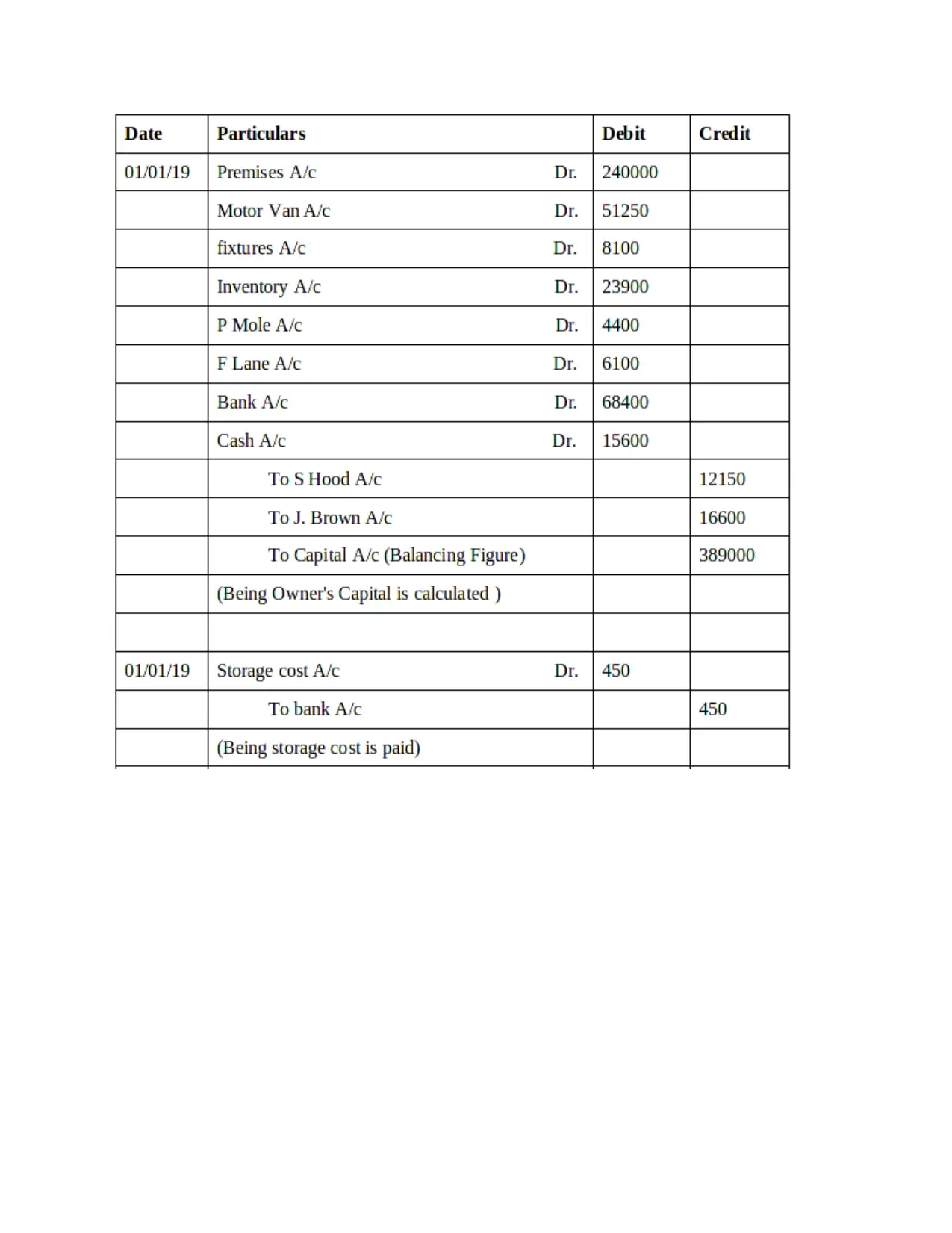
Paraphrase This Document
Need a fresh take? Get an instant paraphrase of this document with our AI Paraphraser

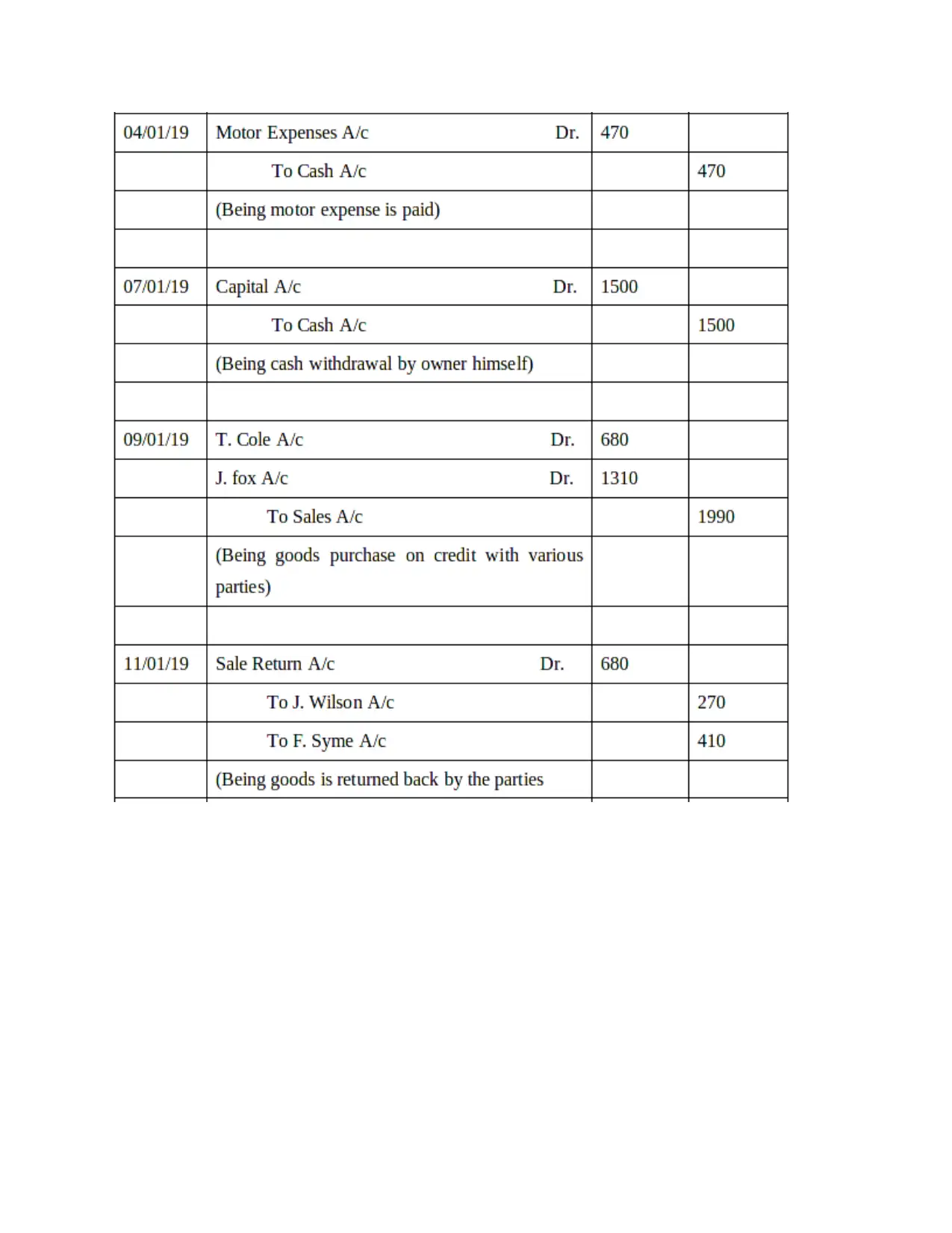
⊘ This is a preview!⊘
Do you want full access?
Subscribe today to unlock all pages.

Trusted by 1+ million students worldwide

Paraphrase This Document
Need a fresh take? Get an instant paraphrase of this document with our AI Paraphraser
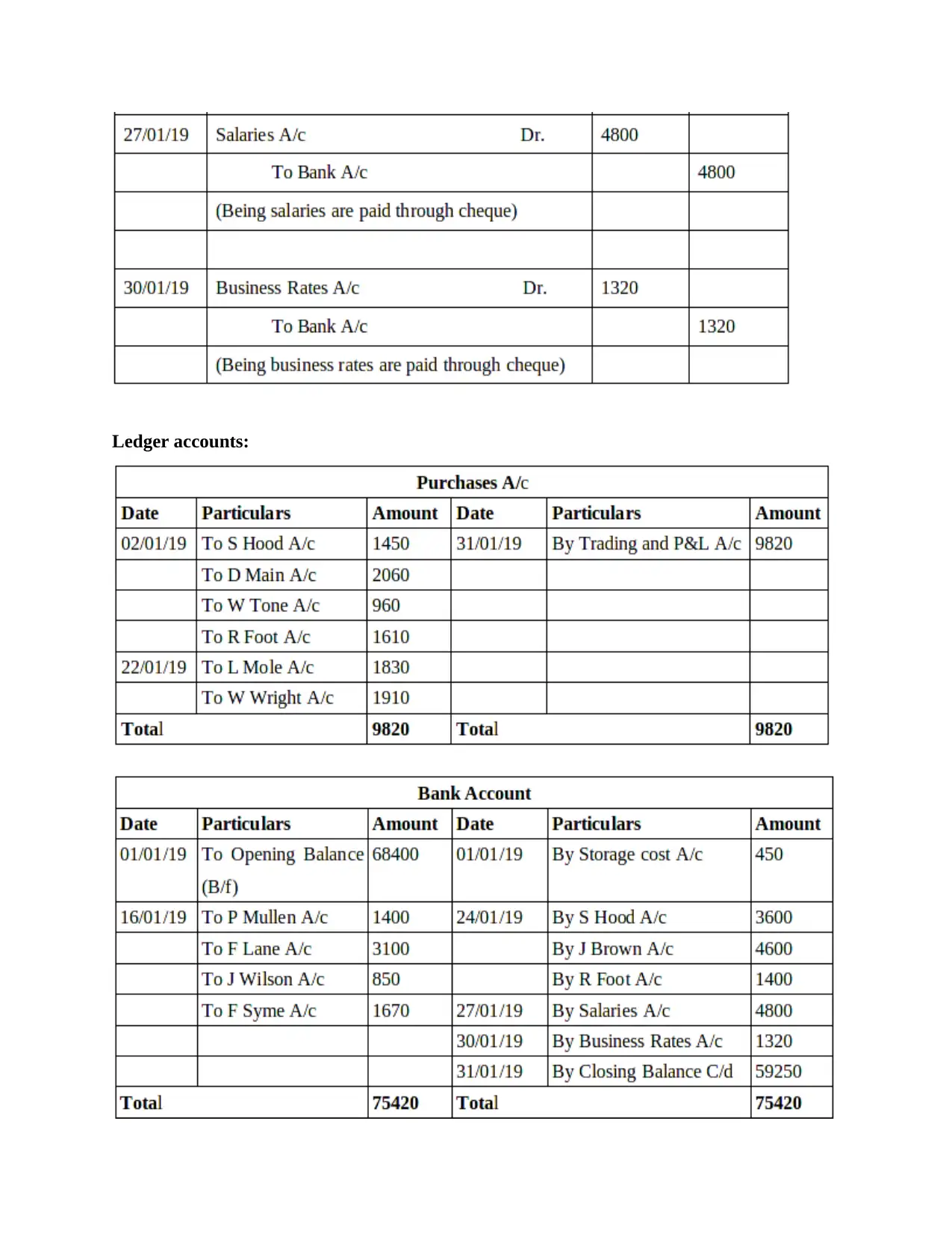
Ledger accounts:
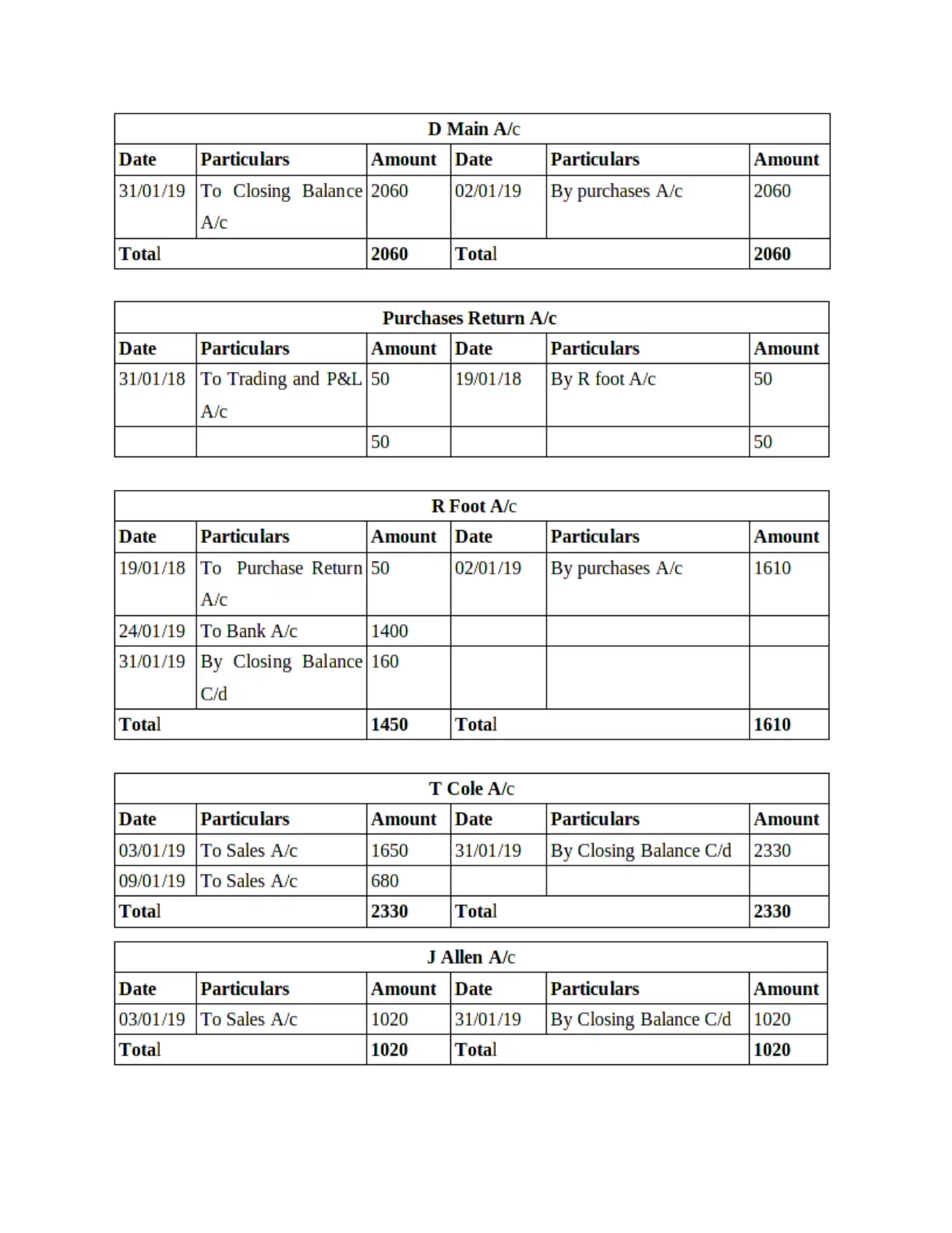
⊘ This is a preview!⊘
Do you want full access?
Subscribe today to unlock all pages.

Trusted by 1+ million students worldwide
1 out of 29
Related Documents
Your All-in-One AI-Powered Toolkit for Academic Success.
+13062052269
info@desklib.com
Available 24*7 on WhatsApp / Email
![[object Object]](/_next/static/media/star-bottom.7253800d.svg)
Unlock your academic potential
Copyright © 2020–2026 A2Z Services. All Rights Reserved. Developed and managed by ZUCOL.





